
Reforming the thought and politics
Continuing to read “A well-made head” Edgar Morin, in Chapter 5 – Learning to live, the author highlights the outset that  most of the twentieth century knowledge contribution was precisely know the limits of knowledge.
most of the twentieth century knowledge contribution was precisely know the limits of knowledge.
After creating a “Viaticum” to face the uncertainties, nothing more appropriate for today’s world, where it say that the strategy brings with it the consciousness of uncertainty that will face and, therefore, contains a bet (p.62) and closes the chapter leading to think that each one should be fully aware that his own life is an adventure, even when even having some alleged security, should be fully aware of participating in human adventure, which launched the unknown in speed , from now on, accelerated (p.63) and from there proposes citizenship.
In Chapter 6, “citizen learning” he proposes that education contributes to the individual’s self-(learning how to accept the human condition, how to live) and teach how to become a citizen, who is also looking for the democracy of the future.
The citizen is defined, in a democracy, in solidarity and responsibility towards their homeland (p.65) and presents a major difficulty in thinking the nation state lies in its complex character, for he is both territorial, political , cultural, mystical, religious (p.66), will now recognize this?
For there is a strong correlation between development of our consciousness and awareness that inhabit our earthly homeland, which is to look across the globe.
In chapter 7, he questions the famous “three degrees” of education, goes on to describe called the primary, where the first questions should be asked, already in secondary education deepen them for that university education is mature.
So the purpose of the “well-made head” is to benefit a program with a question that part of being human, that is would be through the questions of the human being, which finds its dual nature: the biological and cultural (p.75) .
It is therefore necessary to understand the mutual causality interrelated circular causality (retroactive, recursive) and the uncertainties of causality. Thus, training will be an awareness able to face complexities (p.76-77).
In Chapter 8, “the thought reform” Edgar Mohin takes over the second and third principles of the Discourse on Method governing the scientific consciousness. The second principle is taken as the principle of separation; and the third as the principle of reduction (p.87).
. The thought that unites replace the linear and unidirectional causality for causality in a circle and multi-referential; correcting the classical logic by dialogue able to design complementary notions and even antagonists, and complement the knowledge integration of parts into a whole, the recognition of the integration of the whole inside of the parties (p.92-93).
In chapter 9 “Beyond contradictions” Morin shows in the problems of education nowadays. These problems, according to the author tend to be reduced to quantitative terms: “more loans”, “more teachings”, “loose coupling”, “less programmed materials” … out of this reforminhas to further camouflage the need for reform of thought (p.99).
Morin reinforces the thesis that has been discussed throughout the book: one can not reform the institution without providing for the reform of the minds, but if you can not reform the minds without prior reform of the institutions (p.99).
Good reading “The head well-done.
Reforming the thought, the more difficult
Among the various crises we face, once called policrise by the educator and thinker Edgar Morin, one of the deepest aspects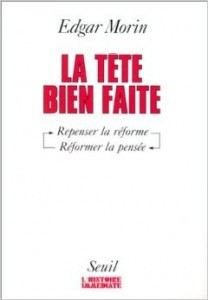 of the reform is the thought, and almost everything is framed in terms of modern thought or supposedly postmodern is in crisis.
of the reform is the thought, and almost everything is framed in terms of modern thought or supposedly postmodern is in crisis.
The book A well-made Edgar Morin Head is a brief formula, but hard, leaving a relatively simple point, say the educator, which suggested Jack Lang, the then Minister of Education in France, initially thought to make a ” manual for students, teachers and citizens “(Morin, p. 9) project that reformed and continued, proposed to overcome the current fragmentation of knowledge through complex thought, through a reform of thought through transdisciplinary teaching, capable of forming citizens planetariums, supportive and ethical, able to meet the challenges of the times.
Chapter I presents challenges, connecting knowledge in separate disciplines, proposing bringing them together in more polidisciplinares contents, cross, multidimensional, transnational, global, planetary (Morin, p.13).
Chapter 2 is the heart of the book, therefore entitled to well-made head, the philosopher Edgar Morin introduces Pascal’s quote “Do not teach men to be honest men, but it is taught everything else” is not a phrase by chance, but reveals the profound moral crisis we all face, not in Brazil but in planetary level, then where honest people can find refuge to face arrest.
In chapter chapter he explains how a general ability of intelligence, can become able to place and address problems of organized way and that makes it possible link between knowledge and giving them direction (p.21).
In chapter 3 the author deals with the human condition, subject already treated by Hannah Arendt and which is connected and part of the ontological resumed, but that depends not only on philosophical and literary reflections, but depends on the renewed and combined natural sciences, which are the subject little anthropocentric, but connected to home: Cosmology, Earth science and Ecology (p.35).
In this chapter the human being is revealed in its complexity: being, while being totally biological and cultural fully (p.40), then we could rethink the culture.
Chapter 4 Learning to live, Edgar Morin presents the thought of philosopher Emile Durkheim “the aim of education is not to transmit knowledge ever more numerous the student, but to create in him a deep and inner state, a kind of polarity spirit to guide you in a definite sense, not only during childhood but throughout life “(p.47), stop here because the thought reform is a revolution.
Operators continue to grow and bill in Brazil
The Telefónica group, its Brazilian affiliate owns Vivo, had already announced the capital increase to around 3 billion euros  (around £ 9 billion) that was used to finance the close a deal with Brazilian operator GVT broadband French group Vivendi.
(around £ 9 billion) that was used to finance the close a deal with Brazilian operator GVT broadband French group Vivendi.
The purchase right with Vivendi is around 4.66 billion euros (close to US $ 15 billion) according to information on various vehicles in sight, which means about 12% of Brazil’s Telefonica, ie continue to earn easy money here.
Vivo had a little difficulty with CADE (Brazilian Administrative Council for Economic Defense), as there are concurrent operations of TIM in select cities in the state of São Paulo, and GVT entered a short time in this market but with aggressive pricing, but still cover and customer base is low, so that the combination does not yet guarantee an improvement in the service state SP.
So what’s the point of the acquisition of GVT, fixed operations of Vivo focus only in the state of São Paulo, integrating GVT to their business, she now has a presence in several cities in the country and will operate with pay-TV, fixed telephony , mobile and broadband, expanding the range of services.
Hopefully this will result in some increase in price and improvement of services.
Machiavelli and Machiavellian
By unstable political situations and imagine how it was possible makes them stable, Machiavelli living from 1969 to 1527, 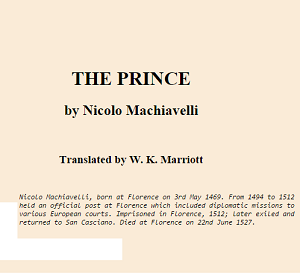 a period in which they establish the first stable governments in many small European states, but almost always ruled by a prince with absolute power, however , wrapped in big trouble and instability, this was the context in which Niccolo Machiavelli wrote his major work “The Prince” (1513).
a period in which they establish the first stable governments in many small European states, but almost always ruled by a prince with absolute power, however , wrapped in big trouble and instability, this was the context in which Niccolo Machiavelli wrote his major work “The Prince” (1513).
Machiavelli tries to answer relevant questions today: that vice and virtue are tolerated in rulers, appeals to humanity’s ruling as follows: all will say it is commendable find a prince only considered good qualities, among all those above, but not and you can own them, not fully observe them, because the human condition does not allow it, you need it to be as prudene you know escape the infamy of those vices that they would lose power: and if possible also avoid the vices that not you take power, but failing that, can leave them without giving them importance.
So while he admits beneficial addictions, he claims that an ordinary moral could lead to destruction of the State and Machiavelli admits political attitudes that may be considered addictions, but sees that there is a kind of addiction that is not acceptable to the State.
Simply put it is acceptable to any dose of favoritism due to the presence in the state of an ordinary person who has vices, but it is not acceptable that any kind of lack of morals is found in rulers because it can lead to destruction of the State.
To assess common men have to have clear criteria for judgment, things would be accepted in ordinary people and therefore tolerable in rulers and things which governments would not be admissible, thus says the author of the Prince: “There are qualities that have the appearance of virtue, but take the prince to ruin; and others, under the guise of addiction, produce their safety and their well-being “of course it’s good this political and not your pocket.
Those are not acceptable vices that to maintain wellness, destroy the welfare of the state and therefore of all the people, finally the art of government must have principles.
Philosophy, medieval history and a book
I received for review and release the cover of the book being released by M Books Brazil, Anne Rooney: 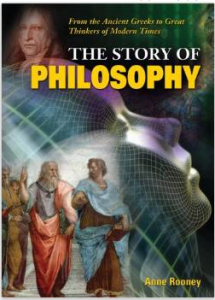 Uma História da Filosofia (translate of The History of Philosophy), the author is a professor at Trinity College in Cambridge, and a master’s degree and doctorate in Medieval Literature, subject to few, and that almost always comes up against prejudices and judgments, being a member of various bodies such as the British Royal Literature Society.
Uma História da Filosofia (translate of The History of Philosophy), the author is a professor at Trinity College in Cambridge, and a master’s degree and doctorate in Medieval Literature, subject to few, and that almost always comes up against prejudices and judgments, being a member of various bodies such as the British Royal Literature Society.
Contrary to imagine the vain philosophy, literature and medieval philosophy is very rich and is not only religious, it was during this period that remade a rereading of all of Western thought foundation issues, and in times of crisis of thought, leia- in Edgar Morin your policrise and the crisis of thought, resume aspects of Metaphysics, Epistemology, Logic, Ethics and Aesthetics, should be taken up in a profound way in the human journey.
As it appears at the opening of the book: ask questions is essential, and the presentation “is concise explanations and in a large number of examples”, with the main attempts to answers asked by philosophers in our history.
As expected explores key aspects of philosophy both in metaphysics and in ethics, and is particularly interesting your resourcefulness of Science, Arts and Technology, very difficult to approach issues in contemporary times, in which it is already the author of several books.
It is a reading that can help reflection on questions of thought today.
Ambivalence: fragmentation of Being
In a way contrary to the Other of Martin Buber, Emmanuel Levinas and Paul Ricoeur, the philosopher Zygmunt Bauman’s liquidity articulates the concept of Other direct with the strangeness, and delivered: “The right of the Other to its strangeness (strangerhood) is the only way which my own right can be expressed, settle and defend yourself “(Bauman, Modernity and Ambivalence, p. 236).
articulates the concept of Other direct with the strangeness, and delivered: “The right of the Other to its strangeness (strangerhood) is the only way which my own right can be expressed, settle and defend yourself “(Bauman, Modernity and Ambivalence, p. 236).
For Bauman ambivalence on the intellectual level would be born of a redefinition of the social order by a “dense sociability” pre-modern, with a view to setting up a secular rational order: “… the modern era defined to itself before more, as the realm of reason and rationality, therefore, all other forms of life were believed to be devoid of the two “(Legislators and interpreters. Modernity, postmodernity and intellectuals, p. 111), but ingenious device liar, Foucault has another theory:
“The eighteenth century was the century of the disciplining of knowledge, that is, the internal organization of each know as a discipline, and, in its own field and both selection criteria which overcome the false knowledge, the not-knowing, ways standardization and hemogeneização of the contents, forms of hierarchy and, finally, an internal organization of centralization of such knowledge in tornode a kind of axiomatization of fact “(Foucault, Il fault défendre a la Societé. Cours au Collège de France, p. 161-162).
Guy Bauman, modern par excellence, is delivered to Panoptical supervision a beleaguered body, which in a perfect society would require exclusion systems that paradoxically would make a “dis-ambivalence” to make possible social life.
Bauman used the Jew as an extreme example of ambivalence, as well the stranger par excellence would be crazy, about which would fall all the exclusion system (Bauman uses the categories exclusion of plant and immobility, when he speaks of globalization).
Criticizing the full form, which would also be somewhat ambiguous, it creates the idea of a body under siege: “The scale of the task, then aggravated by their inherent ambivalence, feeds a besieged mentality: this is the body, and in particular the its full form, threatened on all sides “(Bauman, The fragmented life, p. 127).
Now the very specialization of knowledge has the fragmented life and not the individual who is the victim of it, but today there are many integrators knowledge, see Edgar Morin and complexity.
Bauman decided confusedly reabilizar the new philosophies of world history, for it gave the intellectuals the role of interpreter of the context of pluralism, nothing more idealistic, elitist and improper post-modernity that claims the rights of the common man, the homo sacer, the “crowd” and the fact that democracy (Odio Democracy of Ranciére).
Intend of end of this century some “civilized conversion”, establishing “Intellectual policy tool” not in terms of “science / ideology,” but in terms of a new “truth / power,” which truth and what power? maybe some guru set.
Die Galeano, Uruguayan politician and poet
I read in my youth “Open Veins of Latin America” and would not read again, in fact no more have the book, others kept, I was happy to know that the author would not read.
I was happy to know that the author would not read.
Eduardo Galeano also overcame the political Manichaeism, said at the end of life “Around the world, left-wing political parties sometimes experiences in power have worked, sometimes not, but often were demolished as punishment for being right, which gave margin coups, military dictatorships and prolonged periods of terror, with sacrifices and horrific crimes committed in the name of social peace and progress, “many people want an end to corruption however, lack of freedom is not good for anyone, no dictatorship thrived, this is insanity and somewhat irresponsible.
Eduardo Galeano also said: “in some periods, is the left who commits grave errors”, the Portuguese poet Manuel Alegre, socialist said similar things: “the left thigh is because no dialogue” in the election in Portugal in 2010, and then “The left has to make a self-criticism about what is happening in Europe”, since in Brazil follow the conversation of make believe, no one dares to tell the truth.
In 2009, during the 5th Summit of the Americas, former Venezuelan President Hugo Chavez gave a copy of this book to US President Barack Obama, and about the episode, asked by a journalist Galeano replied that neither Obama nor understood Keys the book “. He (Chavez) gave Obama with the best of intentions, but gave a gift to Obama a book in a language he did not know then was a generous gesture, but a little cruel,” lack generosity, intelligence and politics with a capital P Polis and poet, lives poraí the Aristotelian Zoé.
Sunday my Corinthians (soccer team) play against Palmeiras, get lost hope at least play good football, if Palmeiras will play well deserved win, and this is not policy, but we have to twisting for parties as well.
The dark side web: the deep web
Humanity has a dark side and also the information can be used by this dark side of man, the brown press is one of these 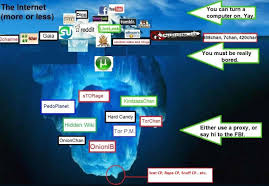 possibilities, newspapers, magazines and even TV channels launched in the air sensationalist programs, with bloody facts, cases of crimes that shocked cities, regions and even countries and the whole world, because this ensures easy audience and feed a morbid side of many people.
possibilities, newspapers, magazines and even TV channels launched in the air sensationalist programs, with bloody facts, cases of crimes that shocked cities, regions and even countries and the whole world, because this ensures easy audience and feed a morbid side of many people.
The Web is not left out, and through the anonymity you can access data and sites that are not easily accessible for information products, books and even relationships that are considered illegal and that this dark universe are transmitted.
There are shops, sites and information about illegal products like drugs, Deep Web to sell books of “immortality”, count of illegal movies or music channels, lotteries you bet on Bitcoin (currency of the internet) without paying any tax and many other strange things, how to ask any object in a 3D printer and receive in your home for a certain value.
There are many benefits that the Internet and the Web have brought, the biggest one is the access to information that should be public, such as accounts and contracts of all public services, especially when they involve the hiring of third parties, the global control of this could greatly reduce corruption around the globe.
Investigative journalists, aimed at collaboration between journalists for information on corruption and misuse of public accounts schemes is a good example of this, also people like Edward Snowden, who despite having worked on sensitive issues of governments decide by a legitimate act report illegal actions that states commit, are an example contrary to “deep Web”.
There is a dark side in all of humanity, the Internet and the Web are no exception
Among the techniques and humanism
It would be a kind of technical human condition or was she separated from the man? Heidegger and Sloterdijk embraced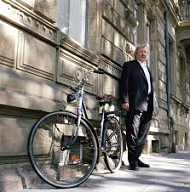 this issue pirmeiro understanding that modernity has fulfilled one of his promises, opening new possibilities of being-in-world (one of the possible translations of Dasein), but after thousands of years man has a promise: to distinguish radically this world, not as an autonomous subject and away from his worldly circumstances, but how to be with other beings, animate or just things.
this issue pirmeiro understanding that modernity has fulfilled one of his promises, opening new possibilities of being-in-world (one of the possible translations of Dasein), but after thousands of years man has a promise: to distinguish radically this world, not as an autonomous subject and away from his worldly circumstances, but how to be with other beings, animate or just things.
The man also won dreamed what the realists no longer as having a high interior that could serve as shelter, fleeting in this world, where he could eventually choose here that wished to be, surpassing living animal, the zoe.
But if Heidegger stopped in his reflections on the technical modernity, one of several liquidity Bauman, it would release the man the edge of the abyss opened by rampant technical unveiling, Sloterdijk attempts to reach the other side without fear of seeing the art as made for ” improve man “of their immunological conditions.
So your antropotécnico arises, or the complement of that would be the onto-antropotécnico, not cyborgs beings and advancing technical about privacy and eye-to-eye human, using for this a concept of “foam”., which means that “society” can not be understood “outside”, thus following a hierarchical and general concepts, but view “inside” as a set of subcultures, communities and networks, forming a set of isolated units, but connected midiaticamente, which means technical forever.
On the contrary, it must be interpreted “inside” as a set of subcultures, communities and networks, a set of isolated units, but connected midiaticamente, which already involves the technique from the start, in a less philosophical language close to the young people: it isn’ t the world B.
It is by Heidegger’s notion of language as a house of being that man can come into existence by being the language (speech, in Being and Time) keeper of the truth of being. Man of the care process with their education (Bildung) in the exit towards clearing generates in Sloterdijk a antropotécnica, which is an onto-anthropology, or if you prefer a antropotécnica in the disturbed sense.
The young Argentine philosopher Fabian Ludueña, near the antropotécnica view of biopolitics and also the human condition Hannah Arendt defines it: “techniques by which communities of the human species and the individuals who compose act on their nature in order to guide, expand, modify, or taming its biological substrate in order to produce what that first philosophy and then the biological sciences and humanities often called ‘man’. ”
Ludueña, Fabian. O (des)governo biopolítico da vida humana, XI Simpósio Internacional IHU, 2010.
Sloterdijk, P. Rules for the human Zoo: a response to the letter of Heidegger on humanism. New York: Harper and Row, 2009.
The common man, political and social networks
It was Plato and Aristotle who thought after the Greek policy for the second pure and simple life of a living 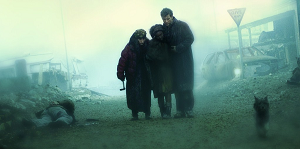 being was a zoé (who lives mere biological existence, a bare life), but the man effectively own language he will a social life, it is only zoé the zoon politikon (political animal), and this will build gradually the proposal of democracy, citizen participation (the inhabitant of the Greek city-state) in an active way in the active life in society.
being was a zoé (who lives mere biological existence, a bare life), but the man effectively own language he will a social life, it is only zoé the zoon politikon (political animal), and this will build gradually the proposal of democracy, citizen participation (the inhabitant of the Greek city-state) in an active way in the active life in society.
The homo sacer was used by Hanna Arendt, Foucault, Agamben, Bauman and recently by Slavov Sizek, which explains the term using an image of the period of the war in Afghanistan, where after a plane bombed a territory, another plane passes distributing food.
Giorgio Agamben in his Naked City, says that biopolitics theory of Foucault converges with that desenvida in Hannah Arendt in “The Human Condition”, which sees that in modernity, homo laborens comes to occupy a place in social relations so that occupy the apex of power relations, leaving it with the public space, so both develop a convergent view on political relations in modernity.
In Brazil it is the figure of the “cordial man”, the vision of a concerned politician with the conditions of low-income populations, but stressing the idea that this people will never have enough culture to become independent and can break the existential domain who has parental welfare.
Social networks are a new way of overcoming this political anonymity, albeit in a diffuse way, even a bit aggressive, is the only space where strangers can express their feelings, show your identity and leave the naked city.

